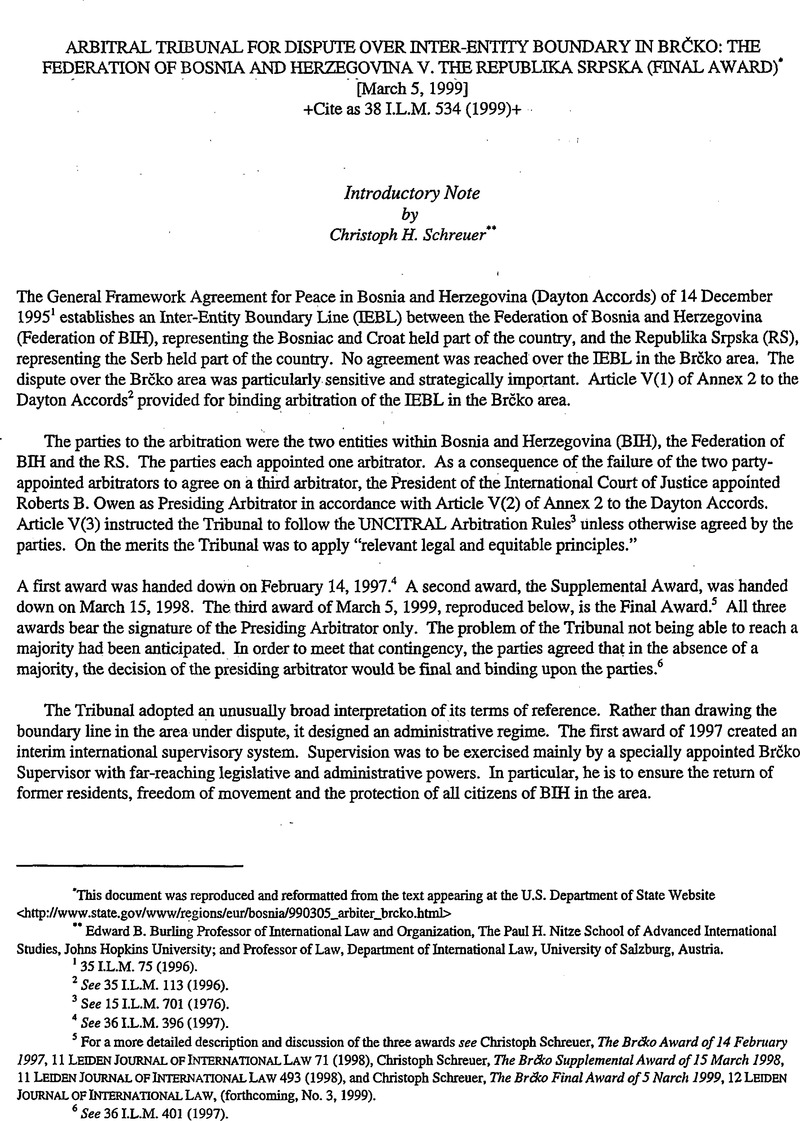Article contents
Arbitral Tribunal for Dispute Over Inter-Entity Boundary in Brčko: The Federation of Bosnia and Herzegovina V. The Republika Srpska (Final Award)
Published online by Cambridge University Press: 27 February 2017
Abstract

- Type
- Judicial and Similar Proceedings
- Information
- Copyright
- Copyright © American Society of International Law 1999
Footnotes
This document was reproduced and reformatted from the text appearing at the U.S. Department of State Website<http://www.state.gov/www/regions/eur/bosnia/990305_arbiter_brcko.html>
References
Footnotes
1 351.L.M. 75 (1996).
2 See 35 I.L.M. 113(1996).
3 See 15 I.L.M. 701 (1976).
4 See 36 I.L.M. 396 (1997).
5 For a more detailed description and discussion of the three awards see Schreuer, Christoph, The Brčko Award of 14 February 1997, 11 Leiden Journal Of International Law 71 (1998)Google Scholar, Schreuer, Christoph, The Brčko Supplemental Award of 15 March 1998, 11 Leiden Journal OF International Law 493 (1998)Google Scholar, and Schreuer, Christoph, The Brč koFinal Award of 5 March 1999,12 Leiden Journal Of International Law, (forth coming, No. 3,1999).Google Scholar
6 See 36 I.L.M.401(1997).
(1) See Award, 15 February 1997, and Supplemental-Award, 15 March 1998, both of which are incorporated in this Final Award by Reference.
(2) It is to be noted that FRY President Slobodan Milosevic personally agreed at Dayton that the Brcko dispute should be resolved by this arbitration and guaranteed RS compliance. Since he has not taken the necessary action to achieve RS compliance, he too bears responsibility for the present result “
(3) The RS contended at the hearings that the reason so few people left Breko for the Federation was that Federation authorities obstructed such returns. Itis true that, ‘according to UNHCR, retuni applications to the Federation have not been processed as efficiently as they should have been, but it is apparent that the flow from Brcko to the Federation could and would have been much higher if RS officials had acted to facilitate such returns.·
(4) The Tribunal is advised that there is a tendency for displaced persons, having lost their property and been uprooted from their homes, to feel insecure and hence to follow hard-line nationalistic party leadership that preaches the advantages of clinging together and resisting mixing with other ethnic groups. There is reason to believe, however, that when a displaced person is allowed to return, there is a tendency to move away from the defensive hard-line political position toward a more tolerant and democratic outlook.
(5) The authority of the entities to delegate their powers to any other lawfully existing institution is confirmed by BIH Constitution Article ill(S)(a), Article IV(4)(e), and Article V(3)(i). ’ ‘'
(6) Pursuant to Article 32(4) of the Uncitral Rules, the Tribunal notes that the party-appointed arbitrators have not yet signed the Finni Award, essentially because (as has become apparent through frequent communications throughout this arbitration) it is not possible for this three-person tribunal to reach a 2-1 majority decision. As a result, “the decision of the Presiding Arbitrator will be final and binding upon both parties.” See Award ’¶5
- 1
- Cited by


